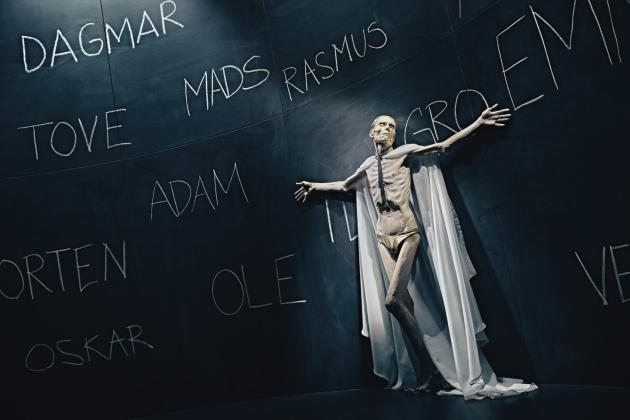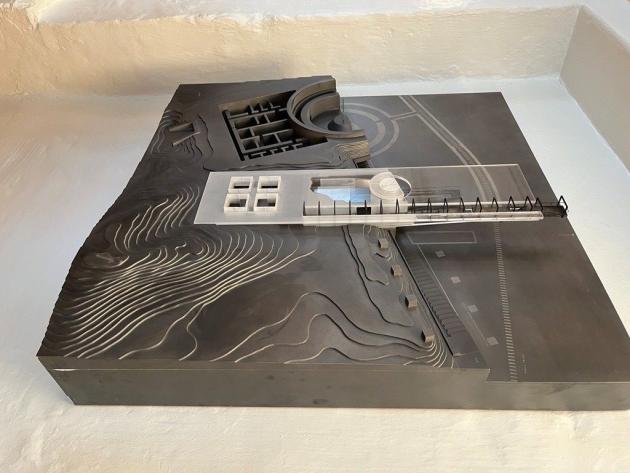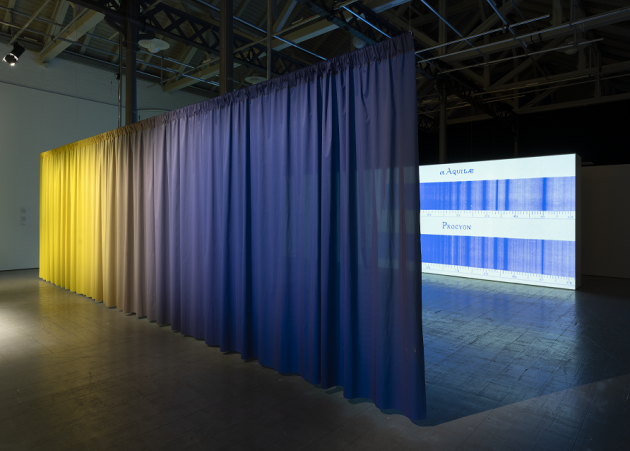New works in the collections in 2022
We are showing off some of the works which Royal Danish Library has received during 2022.
Photograph from Paul Fischer's studio
The painter Paul Fischer (1860-1934) is particularly known for his pictures of life in Copenhagen at the end of the 19th century, when the city was developing rapidly. He eminently portrays the crowd of people in the big city with apartment buildings, traffic and street life. The art of the time is inspired by the still new medium, photography, and many people take photographs themselves. A genre that is becoming popular is the photographs from artists' studios. They are small tableaus with works and artist, and the collection of prints and photographs was lucky to acquire a photograph from Fischer's studio.
In the picture you can see Paul Fischer with his wife Dagny. They look at a painting of Dagny together with Aunt Emma and Uncle Svend
, as it is written on the picture, and an unnamed man.
Photo: Det Kgl. Bibliotek
Madame Nielsen/The Nielsen Movement's archive
Madame Nielsen/The Nielsen Movement's archive is known for its investigation of identities from the early investigation of the Andy Warhol figure in the 1990s to Claus Beck Nielsen and the establishment of Das Beckwerk at Gladsaxe Teater in the 00s to its travelling democracy project in, among others, the Middle East. The donation to the theatre collection includes materials from previous identities such as Claus Nielsen, Claus Beck-Nielsen, Bin Nielsen as well as materials from Das Beckwerk (2002-11) and The Nielsen Movement (2012- ). The donation primarily consists of AV documentation of performing arts and performative works.
The handover took place in connection with the research project Collection of fleeting performing art forms (KFU 2018-2022), which focuses on works that break boundaries in their form.

Photo: Emilia Therese
Knud Jeppesen's collection of letters
The collection of letters from composer and professor of musicology Knud Jeppsen contains many family letters from the period 1913-86, but also greetings from for example Carl Nielsen and other prominent figures from Danish music life. In addition to the letter collection, the library received a larger collection of archive material from Knud Jeppesen, including a collection of programmes, posters, notebooks, for example Notes from Reading begun in 1941, clippings, tapes et cetera.

Photo: Aarhus Universitet
Architectural models of the Documentation Centre Hanstholm
The architectural firm Knud Fladeland Nielsen Arkitekter donated two architectural models of the Documentation Centre Hansholm in June 2022. The models originate from an architectural competition from 1995 for a new documentation centre in Hanstholm about the so-called Atlantic Wall – the fortification that Hitler had built in 1942-44 along the west coast of Europe from Norway to Spain.
The architectural models are an idea of how an information centre about Northern Europe's strongest fortress during the Second World War could look like. It was another architectural firm, Cubo, that won the competition. In this way, the models tell a story about what was not built.
The photograph is of a situational model.

Photo: Det Kgl. Bibliotek
Saxo's History of Denmark, 1534
Saxo's History of Denmark is printed in many different editions. Royal Danish Library's literary history collections have acquired a copy of the edition of Saxo's History of Denmark printed in Basel in 1534. The copy is bound together with an edition by Widukind of Corvey's Res gestae saxonicae from 1532 in a beautiful pigskin binding on wooden boards. The book apparently belonged to the humanist Joan Indagine and has the year 1536 printed on the binding. Stamps in the book show that the book has since been in the Kirchenbibliothek zu St. Mary Magdalene in Wrocław.
Photo: Det Kgl. Bibliotek
Regine Olsen's letters
The world-famous Danish philosopher Søren Kierkegaard was engaged to Regine Olsen in 1840-41. The letters from him to her are preserved in Kierkegaard's archive, but she probably destroyed the letters from her herself after Kierkegaard's death. Royal Danish Library has now received 100 letters that Regine Olsen, who had become an ambassador's wife bearing the surname Schlegel, wrote to her sister from Sct. Croix in the years 1855-1860.
The letters have until now been in the family's possession and only became known to the public when they were included in Joakim Garff's book Regine's riddle. The story of Kierkegaard's fiancee and Schlegel's wife (2013). These letters will be of interest to many studies, including linguistic history, gender politics, graphology and colonial history.
Photo: Det Kgl. Bibliotek
Stella Spectra, 2020
Photography occupies a central place in the practice of the Danish artist Nanna Debois Buhl. The digital installation work Stella Spectra (2020) was acquired in 2022 for the National Collection of Photography. In the work, Debois Buhl works with photography as an image and as science through a focus on the scientific investigations of the British astronomer Margaret Huggins (1848-1915). In the late 19th century, Huggins worked with astro-photography and spectroscopy. By analysing the colour spectrum of the light of celestial bodies, Huggins could explore, for example, the properties and movements of a star. Huggins' pioneering photographic work unfolds poetically in Debois Buhl's installation through film projection and sound.
Debois Buhl uses spectroscopy as an opportunity to reflect on the mechanisms that make something visible/invisible and forgotten/remembered, as well as what roles technology plays in relation to human cognition.

Photo: David Stjernholm